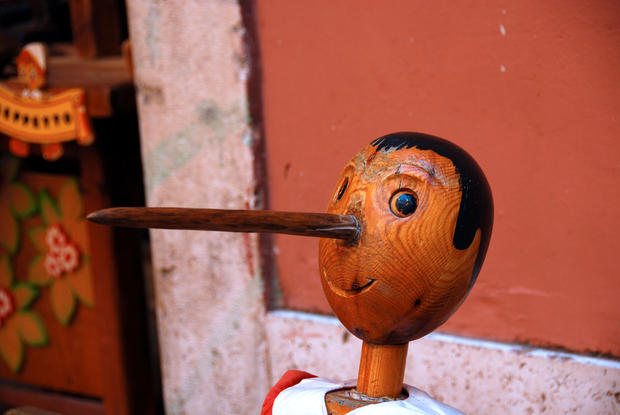When It Comes To Lying, Small Fibs Can Lead To Big Whoppers
SAN FRANCISCO (CBS SF) -- "A lie keeps growing until it's as plain as the nose on your face," said the Blue Fairy to Pinocchio.
Those words were spoken to a fibbing wooden puppet, but apparently there is some truth to the old fairy tale when it comes to humans.
A group of scientists found that the human brain actually adapts to lying, and "small acts of dishonesty can escalate into larger transgressions."
Researchers shared their "slippery slope" theory of lies in an article titled, "The brain adapts to dishonesty," published in this month's Nature Neuroscience.
"From financial fraud to plagiarism, online scams and scientific misconduct, deceivers retrospectively describe how minor dishonest decisions snowballed into significant ones over time," says the study. Basically, small lies lead into bigger lies, which eventually lead to whoppers.
The authors of the study were able to empirically demonstrate "dishonesty escalation" in a laboratory setting.
They say the brain actually adapts to lying, and the emotional tinge of guilt one feels at first, dissipates with every successive lie. Before you know it, the lies often get bigger and bigger over time, and snowball into huge whoppers.
In one experiment, researchers paired 58 men and women and showed them pictures of glass jars full of pennies. There were incentives and disincentives for accurate estimates prompting participants to lie in order to win. Using neuroimaging via MRI, their brains revealed the subjets actually lied more easily with each subsequent lie. The scans showed a reduction in brain sensitivity to lying over time.
The study proffers no excuse for lying, but researchers did managed to delve deep into human behavior and discover the "biological mechanism" that underlies the "escalation of dishonesty."
"The results show the possible dangers of regular engagement in small acts of dishonesty, perils that are frequently observed in domains ranging from business to politics to law enforcement," conclude the authors. "These insights may have implications for policy makers in designing deterrents to halt deceit," because they find that while small at the outset, they may "trigger a process that leads to larger acts of dishonesty further down the line."




